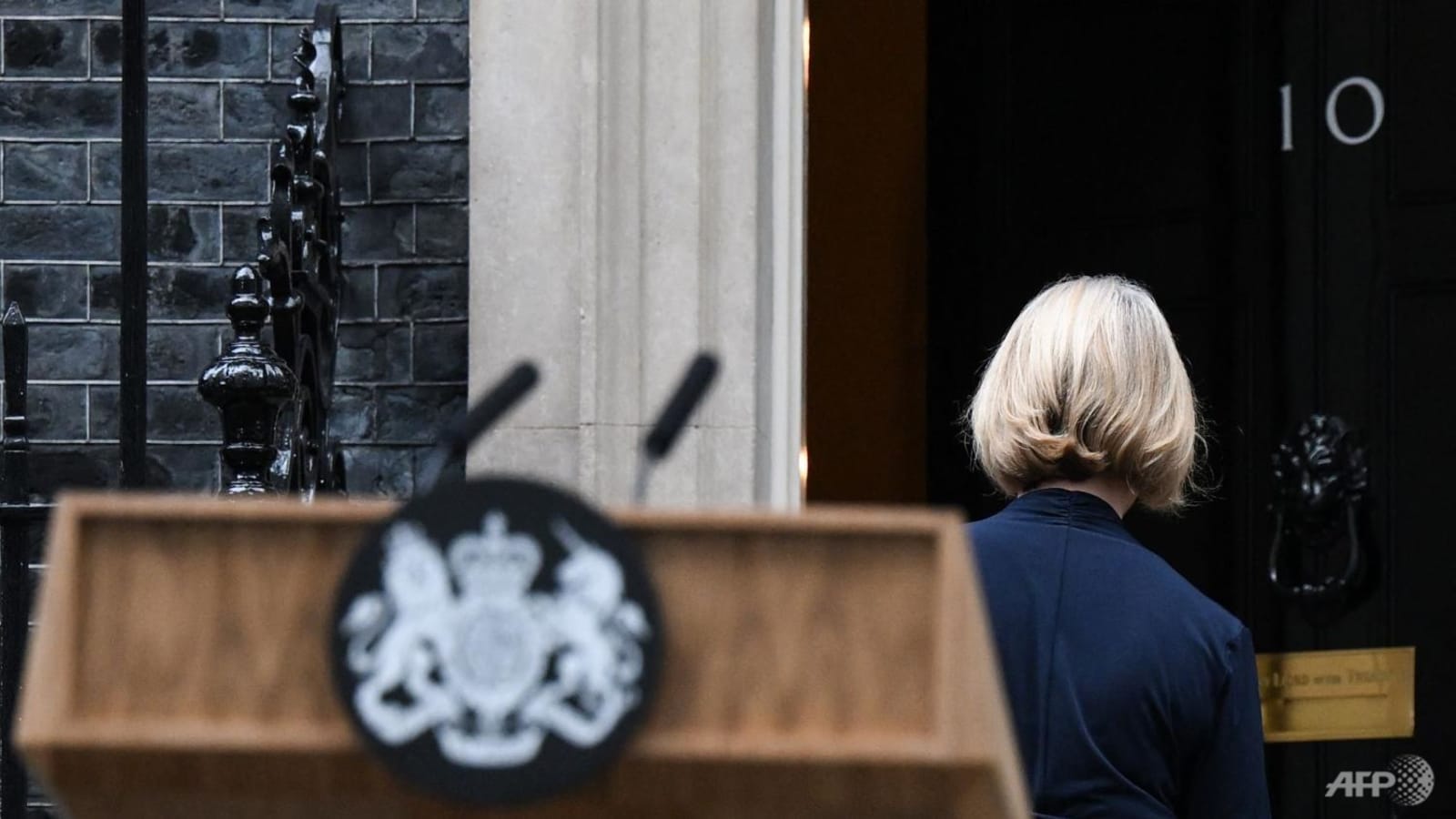
Leaders of UK’s opposition parties are putting pressure on the government to hold a general election after Liz Truss stepped down as prime minister on Thursday (Oct 20), six weeks after she took office.
The ruling Conservative Party has hit a “chaotic new low”, said opposition leader Keir Starmer shortly after Truss’ resignation.
“We can’t have a revolving door of chaos, we can’t have another experiment at the top of the Tory party,” he said.
Starmer called for an immediate general election, adding that his Labour Party is “ready to form a government (and) stabilise the economy”.
First Minister of Scotland Nicola Sturgeon wrote on Twitter that “there are no words to describe this utter shambles adequately”, and called it a “democratic necessity” for a general election to be held.
With dismal showings for the government in recent opinion polls, analysts said that the Conservatives are unlikely to hold an early general election.
The opposition would have to call for, and win, a vote of no-confidence to force a general election to take place, they said.
WHAT IS A NO-CONFIDENCE VOTE?
A motion of no-confidence happens when all Members of Parliament (MPs) vote on whether the current government is fit to continue leading the country.
A simple majority is needed for the motion to pass. If the motion fails, the current administration continues to govern. But if the no-confidence vote passes, parliament will likely be dissolved and a general election will be called.
Confidence motions are usually proposed by the opposition leader, following which the government should provide for a debate and vote.
However, as the ruling Conservatives make up a majority in the House of Commons, it is unlikely that they will vote against their own party.
OPINION POLLS WORSEN FOR TORIES
Growing unpopularity with the British public will likely cause many Conservative MPs to lose their seats in an immediate general election, said analysts.
“(Looking at current polls), if they held the election today, out of 650 members of parliament, Labour would have 411 (seats), and the Tories would only have 135 – the worst results for the Conservatives for least a quarter of a century,” Professor Scott Lucas told CNA’s World Tonight.
“There’s no way (Tory MPs) are going to defeat the government and force an election in which many of them would lose their seats,” said the professor of political science and international studies at the University of Birmingham.
A poll ahead of Truss’ resignation showed the Conservatives trailing Labour by about 36 per cent in ratings. YouGov surveys on the handling of security, unemployment, Brexit, and in particular, the economy, saw sharp falls in confidence for the Conservative Party over the past month.
THE KING COULD INTERVENE
The British monarch has the power to dissolve parliament and dismiss the government. However, the monarch usually stays out of politics and instances of intervention have been rare.
The dissolution of parliament is usually done at the request of the prime minister, typically at the end of each term.
However, if the situation worsens drastically – for instance, if the Conservatives are unable to pass budgets securing the economy and leading to a freefall of the British pound – King Charles would have the power to intervene, analyst Luke Mansillo told CNA’s Asia First.
“Elections could actually be initiated, not from the House of Commons, but from the palace,” said Mr Mansillo from the University of Sydney’s department of government and international relations.
“If the economy is going into freefall because of the acts of government, that is one of the things that the king can intervene in parliament – to call for a general election for the people to resolve it,” he added.
It is also possible that the king could invite a person of his choice to form a government – someone who could win a vote of confidence, according to the BBC.
CONSERVATIVES’ IMMEDIATE PLANS
Conservative Party members will select a new party leader within its ranks next week, who will also become Britain’s next prime minister.
To run for leadership, each candidate will require the backing of at least 100 lawmakers. The party currently has 357 MPs in the House of Commons.
Although experts said that factions within the party will make finding a unity candidate difficult, several clear frontrunners have emerged.
“For now it looks like it will be a straight vote between Rishi Sunak and Penny Mordaunt,” analyst Fabrizio Farina told CNA938 on Friday morning.
Sunak is a former Chancellor of the Exchequer who lost to Truss in the race for the Conservative leadership last month, while Mordaunt is a former defence and trade minister.
“Of the two, Sunak is the most likely to win. He has good support among the Conservative Party, has good economic credibility, and brings a much needed stability to markets,” said Mr Farina, who is a Europe analyst at risk intelligence company Verisk Maplecroft.
Former prime minister Boris Johnson is also expected to make a comeback.
Although he has strong backing from the right wing groups within the party, Mr Farina said that it will be difficult for Mr Johnson to round up enough support as his image has been significantly tarnished due to corruption allegations.
Britain’s new prime minister will face the immediate tasks of soothing market nerves and managing the cost of living.
The new Conservative leader would want to gain back some confidence for the party before they face the next general election, due to take place in January 2025, analysts said.

